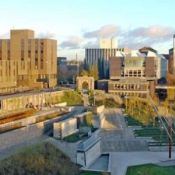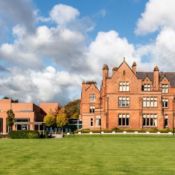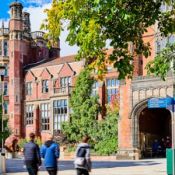
First days in Edinburgh
Arriving in Scotland
I flew into Glasgow, Scotland about three weeks ago, and since then everything has been a whirlwind, but in the best way! I took an overnight flight from Toronto with my family, so when I arrived I was quite tired. However, first I had to get through customs, which was relatively easy. The border officer asked me for my passport, my visa, my CAS, biometric residence letter, and where I would be staying. I had all of this in my carry on, so it was easy to access, and we were out of the airport in no time! I had decided to fly in two weeks before classes started, which allowed me time to travel with my family first, as well as adjust to the time change. I visited family in Inverness for the first week, adjusted to being five hours ahead, and then took the train down to Edinburgh, where I will be attending school for the next year. Inverness was absolutely beautiful, and I highly recommend making it one of the places on your bucket list to visit when you study in the UK!
Travelling the Edinburgh
Arriving in Edinburgh was nerve wracking; I was really hoping I would love the city, because it was where I had chosen to live for the next year of my life. I shouldn’t have worried! The city itself is absolutely beautiful, and surprisingly easy to navigate once you get used to it. I participated in several tours and got to know my way around in the days before classes started. However, I was already homesick, especially when my family flew home, and I hadn’t even been away from home for long. I knew this would be a problem for me, but talking to my family and talking to my flatmates really helped.
Welcome to the University
My program had a Welcome Day, where they introduce you to the course and exciting activities to come over the next year. My program, MSc Publishing, is very small, and only a year long. It gave me the opportunity to meet people in the program, talk to the professors about my concerns, and learn about what was to come. I definitely recommend participating in your school’s welcome week!
Starting Class and Settling In
After classes officially started, I realized I loved my program. I’m happy I decided to do this, and the university has been so supportive of me as I took time to adjust. The professors and counsellors are all here to help, and happy to do so. Exploring the city, learning my way around, and attending classes have all helped me to adjust, and with views like this, how could I not love the city?
My Favourite Parts of the City
My favourite part so far has definitely been exploring the city with my family. We toured all around Old Town, and visited several tourist attractions, such as Edinburgh Castle. This was wonderful, and it allowed me to see a lot of the city in a short amount of time. Victoria Street is an especially pretty area to see!
Recommendations
To those who are considering studying in the UK next fall, I do have a few suggestions. Familiarize yourself with the city as soon as possible, as this will make you more comfortable in your new home. Definitely go to Welcome Week, and any additional sessions put on by your program. They are great places to meet people and adjust to being a new student in the UK!
- Lauren
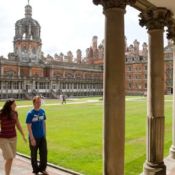
Moving to London
Dreaming about this one stage in my life for the past few years and having it come to fruition as I arrived in London, this was a new beginning and chapter of my life. I know, it sounds pretty climatic and it was (I’d like to think so). While saying goodbyes to my family and friends was difficult, the biggest challenge in moving countries was surprisingly not obtaining the visa or the first few days at university – it was about my outlook on this new move. Personally, moving to London was more than just an educational decision, I wanted to study abroad for the memories and new experiences that it would entail. As such, I learned that you have to be genuinely excited and open for this new change!
As a Canadian, obtaining my visa was a fairly simple process. From applying through the government website and paying the fees (less than 30 minutes) to attending my interview appointment (appointment lasted around 30-40 minutes), the last thing left to do was to wait for the notification that my passport was being mailed back to me. As I received a late acceptance, I had to apply for my visa later than I had originally planned. The extended timeline in applying for my visa led to me having to pay an additional fee for faster processing time of the visa itself. I highly recommend that students (unlike me) apply for their visa the moment they are able (ask your advisor!).
Upon arrival, the commute from the airport to the hotel was seamless since I had booked a taxi to secure a method of transportation – I had two large suitcases and two carry-on luggage. Given the amount of luggage I had and the fact that my flight was delayed twice, taking a bus or train would not have been an option.
At last, I made it to Hogwarts to study in a 3 year LLB program! Jokes aside, Royal Holloway has been known to be to one of the most beautiful campuses in the UK and there is no contesting that. The first few days consisted of setting up my bank account and going back and forth to potential private accommodations around the university campus area. Once I secured a room, I gave myself a few days to do touristy things (eat lots of food at local markets) and buy the essentials for my bedroom and the kitchen. I do recommend that students arriving the next Autumn to frequently check Spare Room and or Rightmove to have an idea of what rent would look like and whether or not it would make more sense to live in the school provided accommodations.
Although this is the beginning to my experience in the UK, I am grateful for the continuing support that I received from my advisors at Across The Pond. As a result of their guidance and resources, I did not once feel worried, nervous, or anxious about the application process. The entire process was as seamless as it could have been. My parting message of this blog to future students – no matter how many checklists you may create, you will not 100% prepared for moving to another country but that is OK!
- Puneet

Studying Education (Teacher's College) in the UK
A common question I get asked here is: why did you choose Scotland to study education? My answer is maybe a little more complicated than other international students, but it involves the coming together of a great programme and some family roots.
After completing my undergraduate diploma, I headed over to South Korea to teach English. I stayed there for a number of years until moving on to China where I worked for an international teaching consultancy firm in Shanghai. We analysed teachers’ resumes if they were interested in working internationally and helped them find schools that would be a good fit. I became familiar with education qualifications from many countries and after two years in China, I felt that my real calling was teaching. I was ready to choose a programme to get certified.
While looking at postgraduate qualifications around the world, I kept coming back to University of Strathclyde’s PGDE programme. It was appealing to me because it was offered at a masters level, and after completing the course I’d have half the credits necessary for an M.Ed. The course was also heavily focused on the placement learning and experiences. The PGDE stands for Professional Graduate Diploma in Education, and the focus is very much about training new teachers for the professional world of education.
Another thing that interested me was Scotland’s Curriculum for Excellence. The program is relatively new and flexible with the adaptability to offer exciting opportunities for teachers. The programme offers vibrant discussions of educational policy in Scotland and invites new teachers to discuss, work in the field, then return and reflect to discuss again. The mixture of theory and practice is an excellent balance for new teachers.
Strathclyde has a sprawling campus which occupies a large chunk of Glasgow’s Merchant City. There are picturesque side streets lined with boutique shopping just a hop away from where students hurry along well-worn steps on their way to class. Lectures take place in old cathedrals, local theatres, and turn of the century buildings as well as the cutting-edge facilities of the downtown campus.
All these buildings are nestled in amongst the vibrant Glasgow restaurant scene, where you can grab a quick bite to eat or stay a while at a coffeeshop nearby. Strathclyde University also recently opened their new Sports Facility, which offers amazing facilities that are included in the accommodation for students living in the halls.
So with an exciting programme in mind, the thing that sealed the deal to come study in Scotland was the Ancestry Visa I applied for. Since my grandmother was born in the UK, and I was from a Commonwealth country (Canada) I could qualify for a 5 year UK Ancestry Visa.
This visa means I can study and work in the UK for the next 5 years so, after gaining my teacher qualification, I’m looking forward to completing my probationary year in Scotland. After studying and working in Scotland for a couple of years, I’ll have an internationally recognised education degree which I can take with me where ever I head to next.
- Ashley

Studying Publishing in Scotland
The UK is one of the most prominent publishing markets in the world, so it makes sense that it would provide courses for people to study the subject before entering the job market! I’m studying for my Master of Science in Publishing at Edinburgh Napier University, one of two Master’s in Publishing programs in Scotland, the other being at University of Stirling. Canada doesn’t really have any programs like this, which is why I chose to study abroad! Read on to find out what you need to know about studying publishing in Scotland!
THE PROGRAM
As I said, I study at Edinburgh Napier University. This program is over 50 years old, and one of the most respected publishing programs in the UK. The program covers everything from marketing to editorial, rights to design, and you get a really good idea of all aspects of the publishing industry! It also provides the opportunity to do a placement at a publishing company, so you also get experience working in the industry! It is a one year program, and that year has been flying by. The first trimester is mainly taught theory, where you learn what you need to know about the history of publishing, current operations, and how to succeed in the industry. Trimester two is focused on production, and you get to choose a product (book or magazine) and take it from the beginning stages to a fully formed, published and printed book! I am currently in this stage right now, and I have to say, I am loving the project so far. It offers a lot of creative freedom, and you learn a lot about using computer software that is standard in the industry while getting to see what it is like to publish something! It has been really rewarding so far. Trimester three is mainly independent study, and you have four months to research and write a dissertation on a topic of your choosing related to publishing! It may sound daunting, but your professors are there to help you every step of the way.
CHOOSING A PROGRAM
As I said, there are two programs for Publishing in Scotland. Stirling is not that far from Edinburgh, and from what I know, the programs are very similar. Both provide you with a great education in publishing, and it really just comes down to where you want to live while in the UK. Stirling is more rural, whereas Edinburgh is more urban, but both are beautiful places to live. As well, Edinburgh is just a short train ride away from Stirling, so no matter which school you choose, you’ll definitely still get to see the other city! However, one advantage of Edinburgh Napier is that you are very central for a lot of publishing industry events that happen throughout the year in Edinburgh, but again, Stirling is just a short train ride away.
WHY STUDY PUBLISHING IN THE UK?
Studying publishing in the UK means that you are very central for a lot of publishing events that happen, and you get to go to them as part of your program, often with student discounts! Throughout the year that you’re in the UK, there are all sorts of publishing events you can visit. In February in Edinburgh there is the Publishing Scotland Conference and the SYP Conference (Society of Young Publishers, which you can also join as a Publishing student, and they provide discounts and support to young publishers starting out in the industry. A really great program.). The London Book Fair takes place in March, and it is free to students, and if you’re already in the UK, it’s much closer than flying over from Canada! As, there are many smaller events throughout the year that can help you succeed in publishing, like CV workshops, speaker panels, and much more that make studying in the UK a really rewarding experience. As well, in my experience, the program isn’t just UK focused; it explores publishing in a world-wide context, and you can work anywhere with this degree!
- Lauren
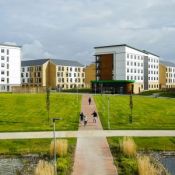
My First Days in the UK (Hertfordshire!)
When I decided to apply for Law School in the UK, it was one of the biggest (if not the biggest) decisions I’d made for myself and by myself. Having the guidance of the Across the Pond student advisors to keep you on task and provide all the information you needed to succeed made this process that much easier. After choosing my program, applying, and accepting my offer came the hard part – applying for a UK visa. I won’t lie and say it was a simple process, it wasn’t - or that it wasn’t expensive, it was. However, if (as it was for me) it is something you really wanted to achieve than it's worth it. During the visa process you will need to pay for your healthcare for the length of time you’ll be in the UK. You’ll also need to book a biometric appointment to scan your fingerprints and take your visa photo. Because of the limited amount of time I had left before the beginning of my program I chose to pay for the priority visa application which returned my visa to me three days after it was submitted.
Arriving in the UK
My arrival in the UK was really quite simple, since the UK border agents are no longer stamping visas, I was able to simply scan my passport at the entry point and proceed to my luggage. The change of procedure for visa entry has made entrance into the UK a smooth and stress-less process.
Welcome Week/ Orientation
When I arrived on campus – on one of their designation student arrival days, I was given information on the events that would take place during ‘Freshers Week’, a free sweater courtesy of the school, and the keys to my flat on campus. Many of the orientation week events where targeted at getting international students situated in the UK. Things like setting up a bank account and providing workshops to help find part time work opportunities were helpful – especially because the UK does not operate by credit scores, your bank account is how you set up phone plans and works as a form of ID.
Don’t worry - orientation week is not all boring, the student’s union provided daily activities aimed at helping students connect and form friendships – games nights, roller skating, salsa dancing, and of course lots of parties geared at different music genres.
Orientation week also provided an induction week for all the classes you would be taking for your different programs for the year. Each course induction provided information on the format of the course and important deadlines to keep in mind, while getting you accustomed to the class structures. At the University of Hertfordshire, which is where I attend, our lectures are posted online in advance for students to view and prepare for the seminars in the following week.
While I’d been to university in Canada and had knowledge of how independent you become as a student, this process took it one step further and really expects you to make sure you’re keeping up with your courses and prepared for your seminars. It takes a little getting used to at first, but this system allows you to take your learning into your own hands to help you gain understanding in each subject while providing a forum for you to voice any questions or difficulties you experienced.
Overall, the beginning of my UK journey has been great. I’m learning how to adjust to UK society and customs, I’ve had a few lectures so far that have sparked my interest, I’ve joined a society and made some friends along the way. If you’re thinking or considering school overseas, go for it. It will not only allow you to get world class education but give you the experience of living in another country and open up many travel opportunities during your downtime.
- Efenosa

